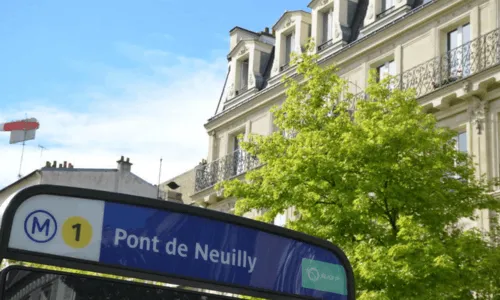Expatriate: where to invest in France in 2026?
Investing remotely is possible. Here are the most profitable and safest areas for expats.
📅
25/8/2025

Many expatriates want to secure their assets in France, prepare for their return or generate stable rental income. But where to invest when you live abroad? This article guides you according to areas, returns, rental management... and your investor profile.
Key criteria for choosing your city when you are an expatriate
When you live abroad, investing in real estate in France can seem complex. However, with the right selection criteria, it is an asset strategy that is quite accessible and often very profitable. The choice of the city is not limited to a question of price per m²: it must also take into account Remote Management, Of taxation And The Type of Return Sought. Here are the three criteria that should never be overlooked before starting out.
Rental Profitability vs Asset Valuation
First Question to Ask Yourself: Are You Looking for a Immediate return Or a Long-term gain in value ?
Some cities offer a Gross Profitability greater than 7% (such as Mulhouse or Saint-Étienne), but reselling is sometimes slower or uncertain. On the other hand, areas like Bordeaux or Paris have a lower yield (between 2.5 and 4%), but a potential of Solid Capital Gain at 10 or 15 Years.
💡 If you have been an expatriate for several years, it is wise to mix the two approaches: a rental property in a city with good returns, and a heritage asset in an area with high real estate tension to prepare for a future return.
Remote accessibility (management, visits, signature)
When you invest from abroad, Logistics should be simple. Some cities have a good network of rental management agencies, electronic signatures (via connected notaries), and concierge services. These are things to check before buying.
For example, in Nantes or Toulouse, many agencies offer a Turnkey Rental Management, including inventory, visits, unpaid insurance, and taxation. This makes it possible to secure the investment, even without ever returning to France.
Taxation and non-resident status
The tax status of an expatriate affects his taxation in France. If you are Non-Resident for Tax Purposes, you can invest in France, but your Land Revenue gold BIC (industrial and commercial profits) will be taxed at a minimum rate (often around 20%, with some exceptions).
Devices like the LMNP (non-professional furnished renter) Remain accessible, with Depreciation of the property, tax cuts, and VAT exemption in some cases. It is advisable to be accompanied by a tax specialist or a real estate hunter who is familiar with the subject.
The Best Big Cities for a Secure Investment
When you are an expatriate, investing in a big French city can be a reassuring strategy. Cities offer strong rental demand, good asset value, and infrastructures that facilitate remote management. Here are three major cities to consider for a stable, long-term investment.
Paris: asset security, despite low returns
Even if its prices are among the highest in Europe, Paris remains The Safe Haven of French Real Estate. With an average price of more than €10,000/m², gross profitability is low (around 2.5% on average). But as an expat, investing in the capital can be a great way to Constitutes a transmissible and secure asset, with easy resale, even after several years abroad.
Many expats choose Paris to buy A Small Furnished Apartment, often in central or student districts (5th, 11th, 14th), in order to rent it as a long-term furnished apartment.
💡 Tip: the Mobility lease, widely used in Paris, allows furnished rentals without a long commitment, to a clientele of students, researchers or employees on a mission, it is a good compromise for an expatriate landlord.
Lyon: balance between valuation and profitability
Second city in France, Lyon attracts many non-resident investors for its economic dynamism, its quality of life and its very good service (airport, TGV to Paris, Geneva, Marseille). With a price per m² around 5 500 to 6 000 000€, the city offers a gross return of 3.5 to 4.5% According to the neighborhoods.
The sectors of Part-Dieu, Montchat and Guillotière attract a young, paid and mobile population. It is also a very popular city for Student or Professional Furnished, with numerous campuses and business centers.
Lyon is ideal for a balanced investment: Good performance, high demand, and Easy resale In case of return to France.
Bordeaux: medium-term potential
Bordeaux has seen its prices soar in the last ten years. In 2025, the market stabilized with an average price around 5 300 €/m². If the rental yield is slightly down (3 to 4%), Demand Remains Very Strong, especially in neighborhoods like Saint-Michel, La Bastide or Les Chartres.
For an expatriate, investing in Bordeaux means betting on a city Very Attractive to Students, Families and Remote Workers, with a rich cultural life and a solid rental offer. The proximity to the ocean and the quality of life also make it a good choice for A future pied-a-terre If you are planning to go home.
Cities with High Rental Potential
If your goal is to Maximizing Rental Profitability While maintaining a reasonable level of risk, cities are an excellent option. They combine affordable purchase prices, stable rental demand (often student or employee), and a More Flexible Management Than In a Saturated Metropolis. For an expatriate, these cities are ideal for easily delegating management while ensuring a good return.
Angers, Tours, Le Mans: accessible, dynamic, well served
Angers (around €3,300/m²) seduces for its quality of life, its student attractiveness, and its economic stability. Neighborhoods near the center or around the TGV station are very popular for furnished rentals. Tours (around €3,400/m²) offers a similar profile, with a strong university presence and a good tertiary fabric.
Mans, For Her Part, Stay The Most Profitable of the Trio With Prices Around €2,200/m² And Returns That Can Climb To 6— 7% gross. Thanks to the TGV line that connects Paris in 55 minutes, it also attracts working people from Paris who work partially from home.
💡 For an expatriate, these cities allow a modest investment (100—150,000 €) with good profitability, especially in real LMNP.
Mulhouse, Saint-Étienne, Limoges: focus on performance
These cities are sometimes unfairly shunned, but they offer Some of the highest gross rental yields in France, often Greater than 8%.
- Mulhouse : between 1,500 and 2,000 €/m², very high demand for small homes close to the center or hospitals.
- Saint-Étienne : 1,300 to 1,800 €/m², numerous universities, and real potential if the purchase is well targeted.
- Limoges : stable, quiet, high demand for well-maintained housing around the city center.
These markets are to be preferred If You Are Accompanied (by a real estate hunter or a reactive management agency), because neighborhoods can be very heterogeneous. In the long term, these assets are easily self-financed.
Investing in tourist or coastal areas
For many expatriates, investing in France is also Have fun. Some Coastal or Tourist Areas Allow Both Profitable rental use (especially seasonal) and The Possibility of Personal Use In the medium term. It is a relevant choice for expatriates who are considering a gradual return or a home in France, without giving up profitability.
Mediterranean side: Perpignan, Sète, Hyères
These Southern Cities Offer a Good Compromise Between Accessibility, Sunshine And Reasonable Prices.
- perpignan (approx. 2,000 €/m²): close to Spain, sunny, it attracts more and more retirees and young workers. Rental demand is stable there, and well-placed properties can be rented all year round.
- Sète (approx. 4,000 €/m²): charming fishing port, very touristy in summer, ideal for seasonal furniture. Cheaper than Montpellier.
- Hyères (approx. 4,300€/m²): highly sought-after living environment, proximity to islands, high-end seasonal rental customers.
💡 In these areas, the LMNP seasonal status Makes it possible to make a good profit from your property while maintaining the possibility of staying there for a few weeks a year. However, be careful with Regulations on Short Term Rentals, which can evolve locally.
Atlantic side: Biarritz, Royan, La Rochelle
Western France Attracts a More Family Oriented and Regular Audience, with a Annual or Long-Term Furnished Rental Demand Well established.
- biarritz (approx. 7,000 €/m²): chic, very touristy, but tense. Ideal for a small furnished studio or a pied-a-terre with high perceived value.
- Royan (approx. €3,800/m²): family resort, very accessible, good profitability in the off-season thanks to retirees and teleworkers.
- Rochelle (approx. 4,800 €/m²): dynamic city, well served by TGV, which attracts visitors all year round. Suitable for a heritage investment with good rental potential.
💡 These cities allow a Long-term valuation, but seasonal management must be anticipated: concierge, taxation, maintenance must be planned.
What are the arrangements for an expatriate investor?
Buying a property in France when you live abroad is entirely possible, but it requires a good understanding of Fiscal, legal and administrative rules. Several devices exist to optimize profitability and facilitate management, provided you know their limits. Here are the most effective options for non-residents.
LMNP: rent furnished, even at a distance
The LMNP status (Non-Professional Furnished Renter) is perfectly suited to expatriates. It allows you to rent furnished accommodation while benefiting from tax regimes, including:
- The Real Regime : allows you to deduct expenses and amortize the property over several years, reducing taxation to almost zero.
- The Micro-Bic : simplified regime with a flat rate reduction of 50%.
This Status Also Works Well For classic rental (students, young professionals) Only for Seasonal rental, provided that local regulations are respected. The investment can be made without being a French tax resident.
💡 If you are an expatriate, a chartered accountant or a tax consultant specialized in LMNP Non-resident can help you structure your file properly.
SCI or Buying in Your Own Name?
For an expatriate, buy Proper nameRemains the easiest way. But in some cases, family investment, multiple assets, estate optimization, the Creating a SCI (Real Estate Civil Society) can be beneficial.
In particular, SCI allows:
- to transmit its assets more easily;
- to invest with several people (as a couple, as a family);
- to distribute management powers.
Attention, the SCI imposes strict accounting management, especially if it is subject to corporate tax. It is better to consider it if you are accompanied (notary, lawyer, asset manager).
Buying Remotely: Electronic Signature and Power of Attorney
Today, You Do Not Need to Be Physically in France to Buy. Thanks to the electronic signature (with some notaries), you can:
- Sign a promise to sell;
- transmit documents remotely;
- Manage the purchase from abroad, safely.
If This Is Not Possible, You Can Also Mandate a family member or a professional (via a notarized power of attorney) to sign for you.
💡 Many real estate hunters (like Mecaza) offer 100% remote support: research, visits, detailed reports, negotiation, signature: everything can be done by video or by secure email.
Buying in France from Abroad: The Challenge of Distance
Investing remotely often feels like an obstacle course. You manage the time difference. You are analyzing photos that are sometimes misleading. The geographical barrier quickly becomes a major psychological barrier. Without a physical presence, you risk missing out on the best opportunities on the market.
Responsiveness: Your Worst Enemy on the Other Side of the World
The French market, especially in profitable areas, never sleeps. A nugget published in the morning has already received a dozen calls during the day. From a distance, you always come after the buyers who are on site. To successfully sign a nugget, you need to have an assistant on site who can visit and make an offer in a few hours. It is the only way to secure a property before the competition.
The Risk of an “Unpleasant Thermal Surprise”
The Energy Performance Diagnosis (DPE) has become the real estate justice of the peace. From abroad, judging the real condition of an insulation or heating system is impossible. A bad grade can turn your investment into a financial abyss. We analyze each technical report for you. We check the feasibility of energy renovation work before you commit a single euro.
A Turnkey Solution to Secure Your Assets
Don't let your expatriation block your wealth ambitions. It is possible to delegate your entire search to a trusted expert. From the first selection to the signature at the notary, we are your eyes and ears on site. For secure support, find out how Finding Accommodation from Abroad with a proven and transparent methodology.
Conclusion
Investing in France as an expatriate is a subject that comes up often. Whether you are looking for Prepare for Your Return, Generate Rental Income, gold Diversify Your Wealth, there are a multitude of cities and devices adapted to your profile.
The most important thing is to Define your objective well (return or valuation), of Select a City Compatible with Remote Management, and to be Accompanied by the right professionals. With a well-defined budget and a clear strategy, even thousands of kilometers away, you can Buy Smart and Rent Peacefully.
🎯 Art MeCaza, we support expatriates in their rental investments in France. Thanks to our national network, our field knowledge, and our trusted partners, we help you Find, Negotiate and Secure the Right Property, stress-free, even from abroad.
FAQS
Can you buy a property in France if you are not a tax resident?
Yes, absolutely. As a non-resident, you can freely buy real estate in France. However, the applicable taxation differs: rental income is subject to a minimum rate of 20%, except for specific agreements. It is important to get advice to optimize your assembly.
Can you get a mortgage while living abroad?
Yes, but it can be more complex. Some French banks agree to finance non-residents, often with a higher contribution (20 to 30%) and precise supporting documents. Other solutions involve international banks or specialized simulators for expatriates.
Do you have to go through a real estate hunter if you are an expatriate?
It is highly recommended. Remotely, a hunter can save you valuable time, avoid location or pricing errors, and negotiate in your best interest. He can also manage visits, diagnoses, and the relationship with the notary or the rental manager.

Article written by Mélanie Jacquet,
Real estate expert from the MeCaza blog.
To go further

24/2/2026
Buying real estate remotely: How to buy in Paris or Lyon without traveling?
Tired of seeing real estate gems slip through your fingers? Find out how to sign your next apartment in Paris or Lyon without even leaving your couch.
Lire l'article ⭢
2/2/2026
Real estate hunter 92: the essential ally for your purchase
Don't waste your time looking for your apartment alone in Hauts-de-Seine: discover how our hunters find the gems of 92 before anyone else.
Lire l'article ⭢
28/1/2026
Reform of the DPE 2026: what are the impacts for housing?
Don't let your assets devalue: find out how the new DPE calculation in 2026 will save (or condemn) your home.
Lire l'article ⭢
